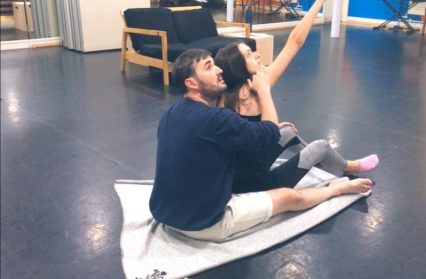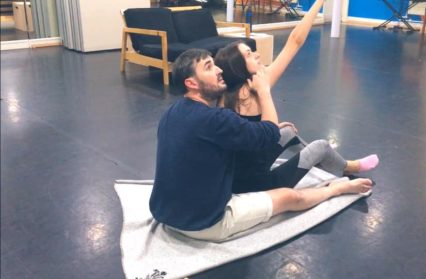Wales Arts Review regular Emily Garside takes us on a journey through the development of her latest play for Clock Tower theatre, Don’t Send Flowers.

I’m probably not supposed to call Don’t Send Flowers the ‘cake and cancer play’ but I do. This isn’t a play about Cancer. Though the word cancer appears 9 times in the play, the word cake appears 39 times. Stay with this fun fact…why talk about cancer when you can talk about (and eat) cake? It’s a simple (and flawed) philosophy but you do what you need to do to survive. And if that’s eat cake, so be it, if that’s have ill-advised relationships, do that too.
This play came about through thinking about dealing with people dying when you’re not quite a kid not quite a grown up. I realised at some point in my late 20s, that in that decade- between 18 and 29- six members of my immediate (and not particularly large) family, had died. We were basically averaging one every other year. Apart from wondering if perhaps we should consider what exactly we were doing as a family there (I promise they were either very old or very ill) that’s a lot of death to cram into a decade. And alongside that a decade where personally you’re supposed to be figuring out who you are.
This started as a play from Grace’s perspective. I used to think it was so thinly veiled that it was obvious (It probably was). In writing my way out of my own Father’s death when I was 20, and in her -and Louis in the play- giving voice to all the weird things that come with dealing with death, but not perhaps doing the ‘right way’. Because until you’re older you also don’t learn that there’s no ‘right’ way. And of being honest about the fact that at 19, 20… that idea you don’t get the kid’s ‘pass’ on how you deal with loss, because you’re not supposed to be a grown up, but in your early 20s, you’re not much of one either. And above all it’s a kind of ‘on the job’ training situation- you can learn how to organise a funeral from YouTube but not how to grieve.
That’s what the play was originally supposed to be. I put it in a drawer and left it there for a bit. But life has a way of intervening. And I ended up with a lot more of John’s perspective first hand than I’d ever intended.
At 30 I was diagnosed with a life-altering condition. In the process of diagnosis, it looked a lot worse than it turned out. And coming from a family where everyone dies of cancer, I distinctly remember saying ‘I’ve always known that’s how I was going to die, I just thought I’d have a little longer first.’ And that, like John’s in the play, my main thought at the time ‘But I’m not finished yet’. Because at 30 you’ve had plenty of time to start things, but not enough to finish most of them. And that’s where John finds himself in the play.
My diagnosis turned out to be a chronic illness, rather than a terminal one. But there’s something about the idea of your body trying to tear itself apart from the inside out and while it wasn’t going to kill me right now, something inside me was going to spend the next 20, 30 or more years giving it a bloody good go. I felt like I shared that with this character I’d created a few years before, and that gave him- and the play- new life (in an ironic choice of words). The final piece of John’s puzzle came in reflecting on the physical impact on my body from being unwell- largely unspoken in the play but an undercurrent- of the personal shame of being medically and physically ‘broken’ as a young adult. Again, like Louis and Grace dealing with grief in that in between child-and-adult- there’s an awkwardness to being physically a bit broken when nobody expects you to be. A sense of shame also. When John collapses in the play it’s a painful reminder of being physically broken. And one that haunts me.
That’s the kind of honesty I was looking to write- not medical text book ‘cancer play’ but something human, about the things that really matter- and the silly things that don’t. ‘No bullshit’ John says in the play- and I wanted all of them to sidestep the euphemisms, and at times the niceties and say and do what is really on their mind. It’s sometimes rude, sometimes brash- quite often inappropriate (a lot like the writer in fact). But that’s what, hopefully makes this a more human look at living with dying.
But Don’t Send Flowers isn’t a play just about death. It’s about- to perhaps invoke a cliché, people coping with life. And admittedly doing it badly. Because none of them expect to be there- you’re not ‘supposed’ to start losing relatives- and particularly not peers- until much later. As my A Level Religious studies teacher said ‘you’ll always remember the first person your own age who dies’. It sounds obvious- why wouldn’t you- but what she meant was that first experience of someone ‘not old’ dying stays with you. This story is about there being no handbook- no YouTube tutorial- for any of this. But that somehow, everyone is supposed to be able to cope. Be it with devastating illness, death and indeed carrying on living. Life (and death) never happen on a timeline, and it’s not like there’s a set of exams to sit to get you through it. That’s why these three characters find each other- the have this sort of ‘streak of recognition’ that none of them are doing very well with any of this- and that’s ok too. Especially if in order to do it you eat a lot of cake. Which unexpectedly became the centre of this play.
Cake features more than death (Cake or Death? The eternal question after all) Because cake is a coping mechanism; the idea that if you’re eating cake, you might not be thinking about the thing you don’t want to think about. And that by not talking about the thing you don’t want to think about, you might actually talk about what really matters. And when the worst happens- as it so often does, a cup of tea, a piece of cake and a good cry also do wonders. And despite the characters in the play being in therapy, there’s a valid point to be made that all the professional support in the world is also no good without ‘real world’ support networks. And that you need sometimes to find the people who ‘get’ it. And they’re the people living- and dying- through it too. I didn’t have that in my twenties, so I guess I wrote that into being.
Is this Don’t Send Flowers a love story? It’s more a love letter to cake. And I don’t mean that flippantly. There’s such a lot of love between the characters- even when they’re getting it totally wrong. But the idea that they can get it totally wrong and still come together for a cup of tea and cake. The act of coming together is what this is a love letter to. This play really is the cup of tea, piece of cake and good cry for me, and hopefully the audience. It’s a chance to speak about the unspeakable- and to get it wrong while doing it. And that there’s always, always time for cake.
Emily Garside has written extensively for Wales Arts Review as a theatre critic.












